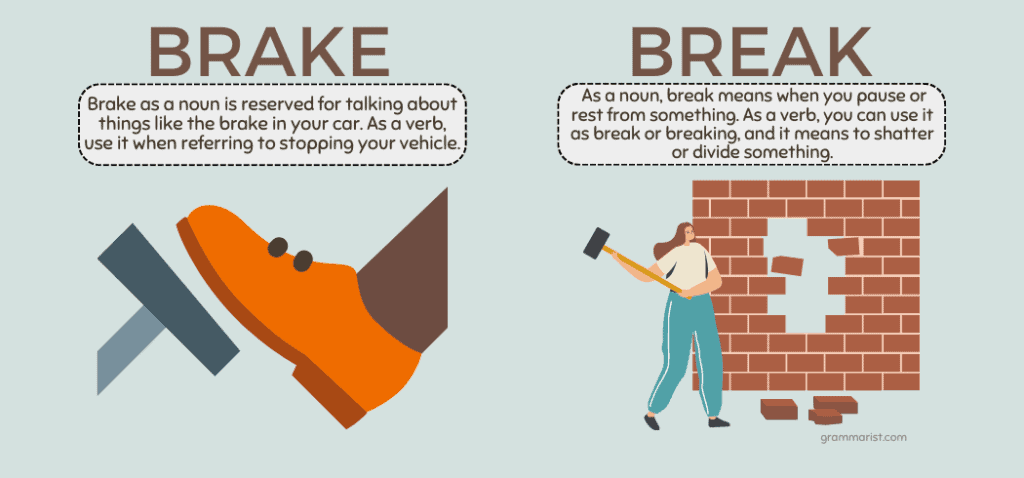Did you break your arm or brake your arm as a kid? If you can’t confidently answer that question, you’re not alone. Even I get the two homophones mixed up from time to time. It doesn’t help that they sound identical. But I’m going to explain how you can tell the difference and never forget it again.
Brake vs. Break: The Big Difference

Although they sound the same, mixing these two homophones up can ruin a sentence’s meaning. Break can be a verb or a noun, as well as brake. I know, confusing, but I’ll explain everything in a second.
Generally, break means to take a pause from something, but it can also mean to break something or divide something in half, while brake is when you stop.
Meaning and Usage of ‘Brake’ as a Noun
Using the word brake as a noun is reserved for talking about things like the brake in your car. You have a gas pedal and brake pedal. Using the brake means you’re stopping the vehicle.
Meaning of Brake as a Verb
The verb form of brake is brake or braking. And you use it when referring to stopping your vehicle. There’s actually a fine line between the noun and verb forms of it. If you hit the brake, that’s the noun. But using the brake is also called braking, which is the verb.
Meaning and Usage of ‘Break’ as a Noun
I know. Why does the same word have to have multiple meanings? It definitely makes learning English that much harder. So, we already established what the word break as a verb is. But as a noun, break means when you pause or rest from something. Like at work, you go on a lunch break or take a break from lifting heaving items.
Meaning and Usage of ‘Break’ as a Verb
Unlike the word brake, the line between break as a verb and a noun is a little clearer. As a verb, you can use it as break or breaking, and it means to shatter or divide something.
Do You Brake or Break a Bone?
Good question, and you definitely don’t want to mix these two up when talking about a broken bone. The correct way to say or spell it is you break a bone. Braking a bone would imply that you’re using the bone to stop, or you’re stopping a bone which neither makes sense.
Brake vs. Break Pronunciation
That’s the thing! They’re pronounced exactly the same, and that’s what makes them homophones. You pronounce either one as bray-k.
Using the Word Break in a Sentence
- I’m ready to go on my lunch break in about an hour.
- He’s the best break dancer I’ve ever seen.
- Don’t break the glass; it’s the only one left!
- Did you break your leg or just sprain your ankle?
- I’m tired of guys always breaking my heart, so I’m just going to take a break from dating.
Why did Russian plane break up in the air over the Sinai desert? (The Guardian)
Using the Word Brake in a Sentence
- Don’t forget to hover your foot over the brake when going through an intersection.
- Hit the brake! There’s a deer on the road!
- You’re braking too much; just ease off and let the car roll to a stop.
Britain is seeking an “emergency brake” to allow countries which are in the European Union but outside the euro zone to delay decisions that could threaten their interests, the Financial Times reported. (The Business Insider)
Hit the Brakes Next Time You’re Confused
So, just remember: break and brake are homophones, but they can also be nouns and verbs. It can get confusing, and one way I remember the difference is that the word break is in the word breakfast, and having breakfast is like taking a break. Hope that helps!

Comments are closed.